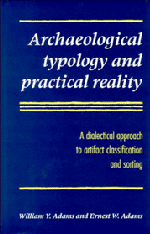 Archaeological Typology and Practical Reality
Archaeological Typology and Practical Reality Published online by Cambridge University Press: 23 November 2009
Since our book is about typologies and types, we should in theory begin by explaining what we mean by the two terms. However, this is much more easily said than done. We will suggest in later pages (especially Chapter 6) that types are among the most complex of all human ideas; so much so that they often defy formal definition (cf. Klejn 1982: 35–6). In addition, a typology has peculiarities and complexities of its own (see Chapter 7). Although by definition it is a system of types, it is more than just the sum of its parts.
We will leave aside until Chapter 7 the question of what is a typology, and will concentrate here on the question of what is a type. Some scientists would probably argue that it is a group of similar things, others that it is an idea or group of ideas about the similarity of things, still others that it is a form of words describing things and their similarity (cf. Dunnell 1986: 191–3). If our discussion is to encompass all of the different meanings given to the word “type” in the scientific literature, however, we must begin by recognizing that all three of the usages described above are legitimate. That is, a type in the fullest sense consists of things, plus our ideas about them, plus the words and/or pictures in which we express those ideas (see especially Leach 1976: 17–22).
To save this book to your Kindle, first ensure [email protected] is added to your Approved Personal Document E-mail List under your Personal Document Settings on the Manage Your Content and Devices page of your Amazon account. Then enter the ‘name’ part of your Kindle email address below. Find out more about saving to your Kindle.
Note you can select to save to either the @free.kindle.com or @kindle.com variations. ‘@free.kindle.com’ emails are free but can only be saved to your device when it is connected to wi-fi. ‘@kindle.com’ emails can be delivered even when you are not connected to wi-fi, but note that service fees apply.
Find out more about the Kindle Personal Document Service.
To save content items to your account, please confirm that you agree to abide by our usage policies. If this is the first time you use this feature, you will be asked to authorise Cambridge Core to connect with your account. Find out more about saving content to Dropbox.
To save content items to your account, please confirm that you agree to abide by our usage policies. If this is the first time you use this feature, you will be asked to authorise Cambridge Core to connect with your account. Find out more about saving content to Google Drive.